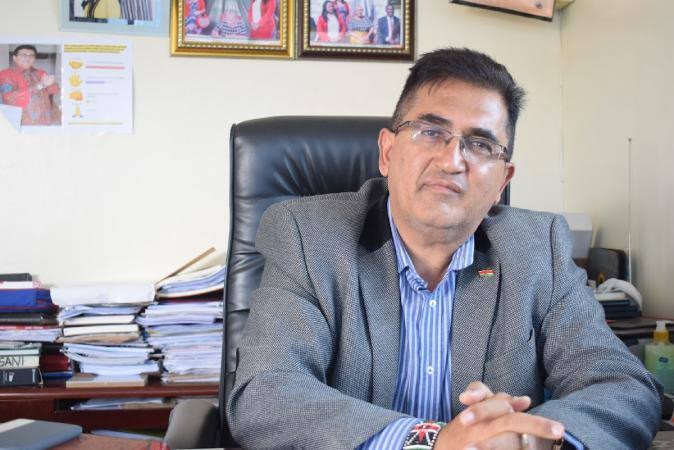News
Impeachment Loading: Residents Begin Collecting Signatures to Recall North Imenti MP Rahim Dawood Over Gachagua Vote
If successful, the recall would trigger a by-election, potentially making Dawood the first MP to be recalled in Kenya’s current constitutional dispensation.

MERU COUNTY – A growing tide of discontent has swept through North Imenti constituency as residents launch a formal recall petition against their Member of Parliament, Rahim Dawood, over his controversial votes on the 2024 Finance Bill and Deputy President Rigathi Gachagua’s impeachment.
The recall initiative, spearheaded by prominent Meru-based lawyer Mugambi Kiogora, has gained momentum amid accusations that the three-term MP betrayed his constituents’ interests by supporting what residents term “punitive and unconstitutional” parliamentary decisions.
The petition centers on two pivotal votes that have sparked outrage among North Imenti residents: Dawood’s support for the controversial Finance Bill 2024, which introduced several tax measures widely opposed by Kenyans, and his vote in favor of impeaching Deputy President Rigathi Gachagua.
“The MP has consistently voted against the interests of his constituents,” said Kiogora, who is leading the legal aspects of the recall process.
“As an advocate, I have chosen to assist my fellow constituents by drafting the recall motion and overseeing the collection of signatures for submission to the IEBC for verification.”
The lawyer and his team argue that Dawood’s actions violate the constitutional principle of representative democracy, where MPs are expected to reflect the will of their constituents rather than party or personal interests.
The recall effort has gained support from various quarters within the constituency. Beyond the finance bill controversy, residents have also been mobilized by the Democratic Congress Party (DCP) officials in Imenti North, who have their own grievances against the MP.
DCP leaders, including women leaders led by Lydia Munene, have initiated their own recall process, accusing Dawood of linking them to the violent Saba Saba protests that rocked Meru county.
The MP had claimed that Gachagua’s DCP was responsible for the destruction of properties witnessed during the protests.
“We will mobilize residents to sign a petition to begin the legal process of recalling the MP,” DCP officials declared, adding another layer to the mounting pressure against Dawood.
Under Kenya’s Constitution, constituents have the right to recall their elected representatives through a petition process.
The recall requires signatures from at least 30% of registered voters in the constituency, which must then be verified by the Independent Electoral and Boundaries Commission (IEBC).
If successful, the recall would trigger a by-election, potentially making Dawood the first MP to be recalled in Kenya’s current constitutional dispensation.
Dawood, who has been elected twice as an independent candidate before joining the ruling party, has dismissed the accusations against him.
However, the mounting pressure from multiple groups suggests a broader dissatisfaction with his representation.
The timing of the recall is particularly significant as it comes amid ongoing political tensions in the Mount Kenya region, where Deputy President Gachagua’s impeachment has created divisions among political leaders and their constituents.
The North Imenti recall petition represents a test case for Kenya’s democratic institutions and the power of constituents to hold their representatives accountable.
If successful, it could set a precedent for similar actions across the country, where many MPs have faced criticism for voting against their constituents’ interests.
The initiative also highlights the growing political sophistication of Kenyan voters, who are increasingly willing to use constitutional mechanisms to express their displeasure with their representatives’ performance.
As signature collection continues, the organizers face the challenge of reaching the required threshold of registered voters.
The process requires careful coordination and sustained public support to overcome potential legal and logistical hurdles.
The recall effort has already drawn national attention, with political observers watching closely to see whether it will succeed in removing an MP who has served the constituency for over a decade.
For North Imenti residents, the recall petition represents more than just displeasure with specific votes – it’s a statement about the kind of representation they expect from their elected officials in Kenya’s evolving democracy.
The outcome of this recall effort will likely influence how other constituencies approach accountability for their representatives and could reshape the relationship between MPs and their constituents across the country.
The recall petition is currently in the signature collection phase, with organizers working to meet the constitutional requirements for submission to the IEBC. The process could take several months to complete, depending on the level of public support and any legal challenges that may arise.
Kenya Insights allows guest blogging, if you want to be published on Kenya’s most authoritative and accurate blog, have an expose, news TIPS, story angles, human interest stories, drop us an email on [email protected] or via Telegram
-

 News2 weeks ago
News2 weeks agoTHE FIRM IN THE DOCK: How Kaplan and Stratton Became the Most Scrutinised Law Firm in Kenya
-

 Economy2 weeks ago
Economy2 weeks agoIran Demands Arrest, Prosecution Of Kenya’s Cup of Joe Director Director Over Sh2.6 Billion Tea Fraud
-

 Grapevine1 week ago
Grapevine1 week agoA UN Director Based in Nairobi Was Deep in an Intimate Friendship With Epstein — He Even Sent Her a Sex Toy
-

 Politics2 weeks ago
Politics2 weeks agoPresident Ruto and Uhuru Reportedly Gets In A Heated Argument In A Closed-Door Meeting With Ethiopian PM Abiy Ahmed
-

 Investigations1 week ago
Investigations1 week agoHow Mexico Drug Lord’s Girlfriend Gave Him Away
-

 Business2 weeks ago
Business2 weeks agoSafaricom Faces Avalanche of Lawsuits Over Data Privacy as Acquitted Student Demands Sh200mn Compensation in 48 Hours
-

 Investigations2 weeks ago
Investigations2 weeks agoKenya’s DCI Opens Probe on Russian Man Who Secretly Filmed Sex Escapades With Women — But There’s a Slim Chance They’ll Ever Get Him
-

 Investigations1 week ago
Investigations1 week agoHow Close Ruto Allies Make Billions From Affordable Housing Deals

















